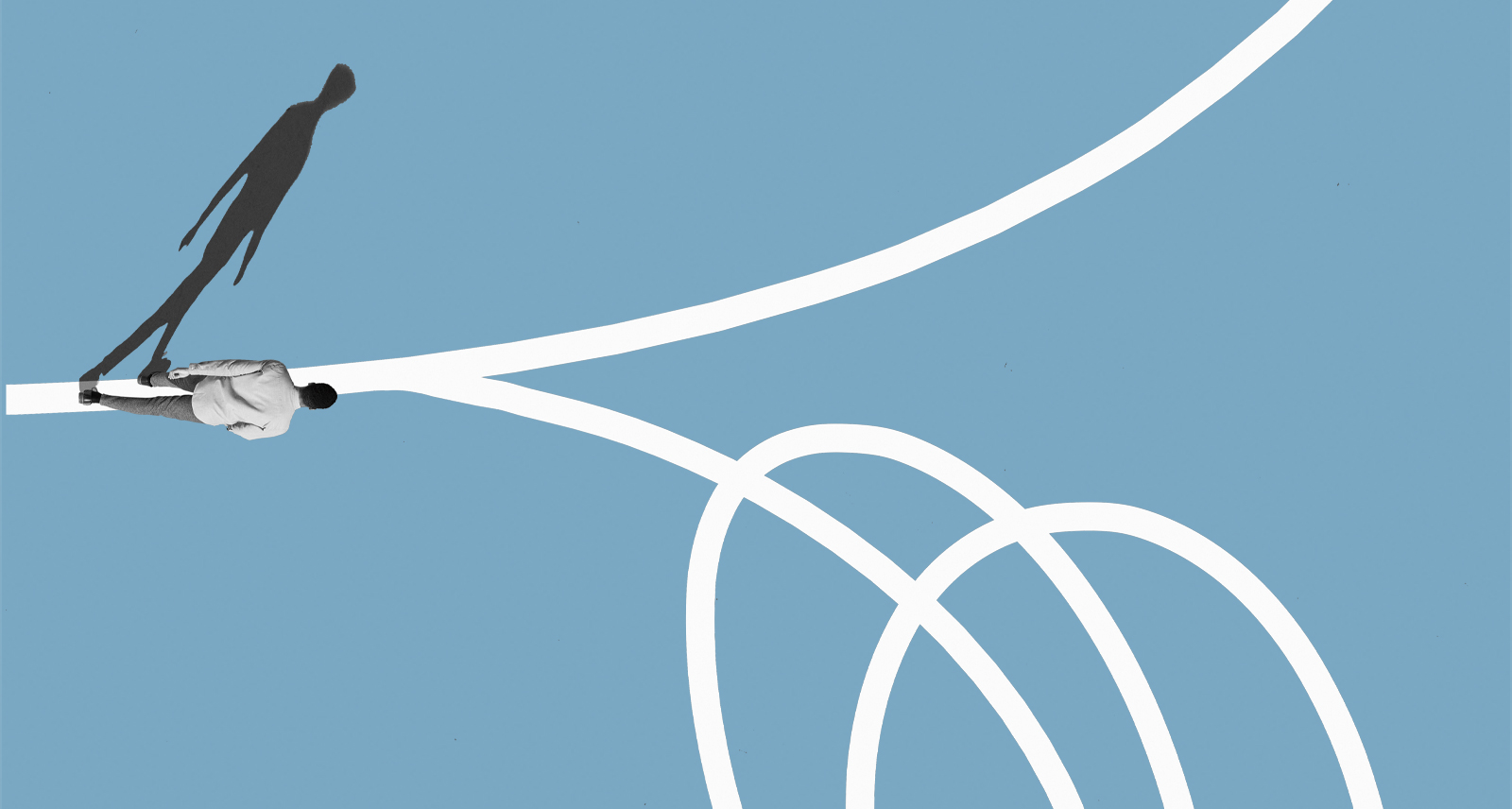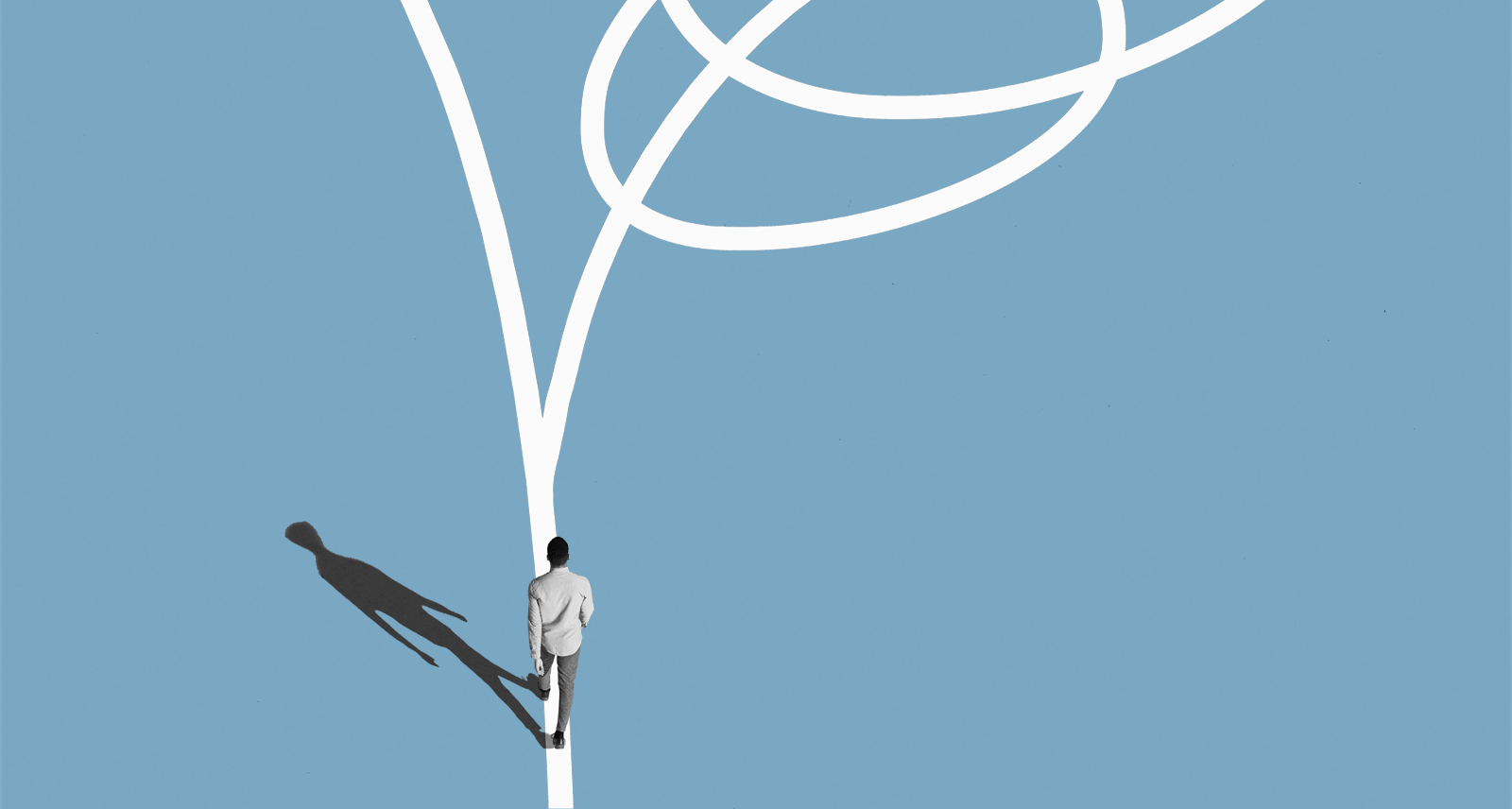My Dad and the Ghosts of Self-Help
For a group of “non-physical beings of infinite intelligence,” Abraham has a half-decent sense of humour. Abraham is a “nebulous mist,” a consortium of timeless spiritual entities who have access to the universe’s deepest and most secret knowledge. They are also teachers. They speak with one voice through Esther Hicks, an author and inspirational speaker who begins her lectures by slipping into a kind of trance. She emerges speaking in the detached, sagely tones that Hollywood has primed us to believe are the lingua franca of benevolent spirits.
Hicks insists she is not “channelling” Abraham, though to the naive observer, this is probably the closest thing to a textbook example. Instead, she “translates” Abraham’s teachings from higher dimensions for us right here in regular old dimensions. But they — meaning the spirits whom Esther is channelling — manage to squeeze in a few jokes too.
“Why the name Abraham?” Abraham asks rhetorically during one lecture. “We wanted to be first in the phone book.” When a roadie briefly peeked out from backstage during that same lecture, Esther/Abraham didn’t even flinch. “Pay no attention to the man behind the curtain,” they instructed. The audience loved it.
If you’re familiar with the mannerisms of self-help gurus, you can probably picture the rehearsed way this message was delivered: assured, charismatic, effortlessly quick-witted. Abraham is the author of the modern iteration of the most famous doctrine of the self-help genre: the Law of Attraction. The overarching philosophy posits that anything you can imagine is yours to be or to do or to have. More money? If you believe you can have it, it’s yours. The approval of your peers? The universe owes it to you, vibrationally speaking. Good health? Manifest it.
The Law of Attraction regained popularity in the book-turned-film The Secret, which was originally narrated by Abraham via Hicks. That changed after Hicks failed to get paid an agreeable sum, possibly owing to a failure of imagination. Nevertheless, all parties moved on quickly. Those who preach the secrets of the universe are often sanguine about earthly squabbles. Also, Hicks was getting stacks of cash thrown at her by audiences eager to tap into Abraham’s wisdom. So there’s that.
In addition to the Law of Attraction, Abraham’s teachings can be boiled down to 11 axioms:
1. You are a physical extension of that which is non-physical.
2. You are here in this body because you chose to be here.
3. The basis of your life is freedom; the purpose of your life is joy.
4. You are a creator; you create with your every thought.
5. As you are choosing your thoughts, your emotions are guiding you.
6. The universe adores you, for it knows your broadest intentions. [Editorial interjection: Thanks!]
7. Relax into your natural well-being. All is well.
8. You are a creator of thought ways on your unique path of joy.
9. Actions to be taken and possessions to be exchanged are by-products of your focus on joy.
10. You may appropriately depart your body without illness or pain.
11. You cannot die; you are everlasting life.
If this strikes you as a little too rosy, you’re not alone. Dave Chappelle has a stand-up bit on The Secret where he challenges a believer to fly to Africa to pass on this wisdom to a child who hasn’t eaten in a week. “What you need to do is visualize some roast beef and mashed potatoes and gravy,” he jokes. “The problem is, you have a bad attitude about starving to death.”
But at one time, I didn’t think Abraham could be dismissed so easily. To be honest, I still don’t. There are people in my life — smart people, some of the best people I know — who see tremendous value in their teachings. One of them was my dad.
When I began writing this piece, I catalogued my dad’s collection of self-help titles. There were classics like Dale Carnegie’s How to Win Friends and Influence People. There was Tony Robbins’s Awaken the Giant Within, complete with over-the-top typeface and his beaming smile. There were 26 cassette tape volumes of Robbins’ Power-Talk! There was Stephen Covey’s 7 Habits of Highly Effective People, along with the not-at-all-unexpected sequels and spinoffs including The 8th Habit and The 7 Habits of Highly Effective Families. There was Wayne Dyer’s The Power of Intention and 10 Secrets for Success and Inner Peace. And, of course, there was Abraham: a young adult fiction trilogy called The Sarah Series, and 23 CD lectures.
“Self-help isn’t really about learning new things. It’s about awareness. It gives you a grip on the reins when you feel yourself becoming the kind of person you’d rather not be. It draws your attention back to single-entendre principles: love, kindness, patience. And the thing is, it works.”
The first time I listened to Abraham, we were driving up to a rustic little resort in Killarney, about four hours north of Toronto. I was 15 at the time. As a metallurgical engineer, my dad spent a lot of time on the road visiting clients and project sites. He never wasted a moment of those drives. He was constantly on the phone, or hydrating, or recording notes to himself for things he needed to do later. In his office, he tacked a handwritten sign by his desk instructing himself to “check [his] posture.” He couldn’t even sit without accomplishing something.
He brought that same attitude to his relationship with his kids. These long drives — to cottages and hockey tournaments, mostly — became bonding time. We would talk about everything from those little factoids nerdy kids bust out after school (you have any idea how many Earths can fit inside the sun?) to sweeping, unanswerable theological questions (how do you square the theory of evolution with the existence of God?). He was always thoughtful. He was always patient.
By the time we went to Killarney, I had read Covey’s 7 Habits of Highly Effective Teens and had gone with him to a few wellness seminars. (Among his self-help books, I also found an 18-page Deepak Chopra lecture he transcribed himself.) But Abraham was further out there. I remember the stilted cadence, the odd tenses and phrasing. “We are wanting you to understand…”; “We are appreciating your presence.” Esther is referred to in the third person. They talk about “becoming,” “vibrational alignment,” “intentionality.” This was before the boom of the modern wellness and corporate coaching industries that milk those buzzwords no-one seems to understand except the people getting paid.
Abraham’s language is impenetrable to a 15-year-old. It’s reminiscent of the verbal sleight of hand used by psychics, mediums, and astrologers, framing your earthly experiences in terms of cosmic significance. “You are causing an expansion of your time–space reality and of the universe at large,” Abraham says. The very alignment of the planets is contingent on what you are thinking, according to this line of thought.
Then comes the advice for how to think, which is all action-oriented and impressive-sounding but ultimately non-specific and unfalsifiable. There’s a trap door that falls out beneath you the moment you begin to interrogate the Law of Attraction; if what you want doesn’t come to you, you’re thinking the wrong things. That’s true even if you think you’re thinking the right things. How do we know? Because you haven’t gotten what you want. Boom! See that?
Abraham says most of this erroneous thinking is actually “pointing out the absence of what you want,” which results in more absence. Conversely, if you get what you want, it’s proof. Just as quickly as the bottom falls out, the logical door shuts behind you. In either case, your thoughts attract and repel what you want. Money, happiness, health, and success are a part of who you are.
My dad was constantly looking for ways to be a better father, husband, and business owner. Self-help gave him a frame-work. The readings and tapes served both as reminders and tools to sharpen his principles. A lot of people (including yours truly) tend to write off the genre as clichéd and saccharine, but my dad was fiercely unashamed of embracing these things in the service of being a good person. I admire him for that.
“There’s a trap door that falls out beneath you the moment you begin to interrogate the Law of Attraction; if what you want doesn’t come to you, you’re thinking the wrong things.”
Recently, I came across an old email where he shared a little parable about a boy whose dog is dying, no doubt penned by whoever writes those chain emails your sweet, clueless grandparents pass around. When the boy asks why dogs don’t live that long, his older brother explains that people take time to figure out how to live a good life. “Dogs already know how to do that,” he explains. A dog’s life is full of simple pleasures which they can enjoy with a kind of full-heartedness that people can’t: the pure ecstasy of the wind in their face, naps, running to greet their loved one at the door, digging. If we were more like dogs, when someone was having a bad day, we would simply be silent, sit close, and nuzzle them gently.
For one second, table your opinions about the kinds of people who share emails like this. Isn’t that notion beautiful? Would our irony-poisoned world not be a bit better if we didn’t feel so uncool about finding meaning in stories like this?
Self-help isn’t really about learning new things. It’s about awareness. It gives you a grip on the reins when you feel yourself becoming the kind of person you’d rather not be. It draws your attention back to single-entendre principles: love, kindness, patience. And the thing is, it works. Your decisions about how to think and what to pay attention to can change your life. Really. I don’t think the universe is actually conspiring to grant or deprive you of what you want based on your thoughts. But I do think carefully tuning your thinking affects your wealth, health, and so on. Confidence, even independent of aptitude, is a major predictor of success in everything from business to dating. Placebos are real. Believing you’ve taken medicine has scientifically validated medicinal effects.
The wrinkle here is that most self-help is, by design, more a shortcut to these principles than a way to meaningfully live them. Shortcuts can be useful. I’m often just as interested in interviews with authors I admire as I am in their writing. I read reviews, tweets, Wikipedia pages, and anything that gives me enough to not feel like a slack-jawed dunce at parties with smart people. But I would not pretend that reading Dostoyevsky’s Wikipedia page would tell me everything I need to know about his books. Self-help offers no such distinction. The secret of life is in the maxims.
Generally speaking, self-help works very well when your attitude is the relevant factor. If it gives you the confidence to pursue your dream career, makes you a joy to be around, helps you handle life-altering news with equanimity, or gives you the strength to avoid a meltdown after some prick snakes your parking spot, that’s great. But your attitude isn’t the only thing that matters. Where self-help fails is in its promise that, with sufficient attention and attunement to the innumerable and unknowable forces acting on your life, you can control all of them. That promise was very appealing for someone like my dad.
But the world’s more complex than that. In a 2007 profile for the Independent, journalist Robert Chalmers interviewed the beings of infinite intelligence themselves via Esther. “Could I grow back an arm that has been amputated…?” Abraham said people have asked them. “We say yes.” When asked about various forms of human affliction, they said things like “[People] are poor in vibration before they are poor in manifestation.” What about the Holocaust? Chalmers asked. “Are you saying six million Jews invited extermination upon themselves?” Instead of fielding it the way a person with any moral compass might — “No. Next question.” — Abraham responded with exquisite tactlessness: “We would never say they invited it wantonly or knowingly. But we unequivocally say that nothing happens to anyone without a predominant vibration that matches it.” These justifications are not merely stupid — they’re cruel. But most people struggle in more ordinary ways. Even then, the inadequacies of Abraham’s worldview have a way of revealing themselves.
I’ve grappled with how much to share about my dad’s life. Around the same time we went to Killarney, things had been difficult. There were marital issues, and his business was suffering. He didn’t feel like himself. He tried hard to figure out why. On July 1, 2008, he took his life.
I don’t blame self-help for what happened. People are complicated, and their decisions can rarely be attributed to a single variable. Abraham should understand this. They should understand that, when you are depressed, you cannot conjure joy with a supernatural instruction manual and willpower. The tools aren’t fit for the purpose.
“Where self-help fails is in its promise that with sufficient attention and attunement to the innumerable and unknowable forces acting on your life, you can control all of them. That promise was very appealing for someone like my dad.”
My dad thought he could, though. Reading his journals, you could see it. His struggles became proof to him that he was thinking the wrong things, drawing more of what he didn’t want into his life. He believed that if he could just find the right thoughts, he could ride them downstream. He would be himself again. Abraham says that people are less themselves when joy is absent, that joylessness is a product of being disconnected from who they really are. I don’t believe that. Sadness is as much a part of who we are as joy, and feelings aren’t always things we can fix. In my dad’s later years, it was too dark for him to consider that. He just wanted the pain to stop.
My aunt, who was close to my dad, remembers the last time she saw him. One afternoon at the end of June, they met at Beechwood Cemetery in Toronto. They sat under an oak tree by their father’s grave until it started raining. They talked about God and her dreams. They ate peaches. He told her he wanted to go back to his hometown in northern Italy for a month to revisit his roots.
I like to imagine that brought him some relief — the thought of returning to a place where he could feel like himself. I want to believe he felt something good in his final days. Maybe he did. But maybe, to our vast and unfeeling universe, what I want to believe doesn’t make a difference. Maybe I have to be okay with that.











